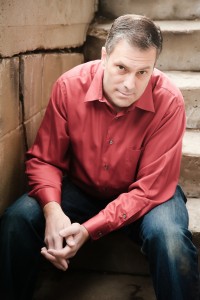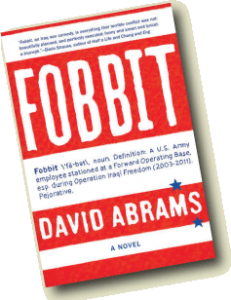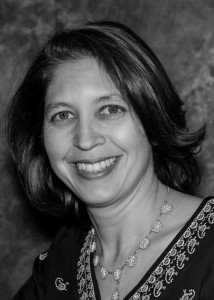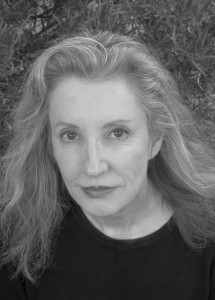After the great success of his debut novel, Fobbit, I wanted to check in with David Abrams to see what he's working on next. I've come to rely on his daily book blog, The Quivering Pen, and when he stopped posting earlier this year so he could focus on his own writing, I grew curious. David is such a vital and generous presence in the literary community, I was intrigued to learn how he manages to do it all--pen books and oversee an important and much-read blog. Here is his answer to the time management conundrum that all writers face:
 I'm a people pleaser.
I'm a people pleaser.
Before you go saying, "Hey, that's great!" let me stop you by saying, People Pleasing has ruined my soul. Oh sure, it's all well and good on the surface: putting others first, altruism, the wisdom of New Testament Bible verses, etc., etc. But all that Others First philosophy means I put my own needs in second, third, or last place. I spend so much time thinking-slash-worrying about what others think and feel and need that it leaves precious little "Me Time." (To my dear wife who might be reading this: please note that I will ALWAYS put you first--just wanted to clear the air on that.) Whenever I am reading another author's manuscript for a blurb, championing a new writer's novel on Twitter, or spending hours writing a Quivering Pen blog post about literary trends, it means I'm not working on my own writing. Don't get me wrong: I blurb/Tweet/blog because I want to and because I feel passionate about what I'm reading. But the truth is, no original words of mine are being written during this time.
So, when you ask how I prioritize my work, my response will probably be: "as an afterthought." Occasionally, I'll go through bouts of creativity where I'll shake off this malignant thinking and get down to work on the manuscript waiting, dusty, in the bowels of my hard drive. The truth is, those one-off periods of inspiration need to be the rule not the exception. I'm trying to get better. I really am.
I thought I was halfway to the cure at the beginning of this year when I nailed up the shutters on my blog, The Quivering Pen, saying that I needed to Blog Less, Write More. So long, and thanks for all the fish.
That golden period lasted for about four months. I tinkered around on the novel--long overdue to my editor--which I've been trying to write for two years, and I started three short stories, which remain in tattered fragments on my computer. I did a lot of staring out of my office window and distracted myself by reading books by Michael Chabon, John Kennedy Toole, and Emily St. John Mandel which I'd been putting off for far too long. I drank multiple cups of coffee, I stared out the window, I tinkered.
Then I snuck back to the blog like an adulterous husband drunk-dialing his mistress in the middle of the night.
My problem is that in addition to being a People Pleaser, I'm also a card-carrying member of the Procrastinator's Club and am professor emeritus at the College of Spread-Too-Thin. I take on too much and end up doing none of it to perfection.
I suspect I'm not alone at these clubs (I see several of you nodding your head in sympathetic recognition). It's comforting to be in a society of many, I suppose--but warning lights are flashing red right now: comfort leads to complacency, complacency is the first rest stop on the highway to hell.
I'm sorry, but I must leave you now. I must get to work--the selfish, ego-driven work of writing my own damn words. How to get there? I don't know, really. The creative life comes with no owners manual, no instructions to insert Tab A into Slot B. Giving up the blog, saying "no" to blurb requests, taking a Twitter vacation--those aren't the remedies (I've already tried all of those things). Sleeping less and rising earlier in the morning? Maybe, but I'm already throwing off the covers at 4:30; don't know if I can crack open my eyelids any earlier than that. Making the novel-in-progress the first thing I turn to in the morning? That's a start. Better time management? Of course.
If I'm honest with myself, if I look the mirror man in the eye, I'd have to say that the best first step is moving past the fear: the fear of failure, the fear of letting others down, the fear of wasting time at the keyboard. Instead, what I really need to be afraid of is failing to please myself. That's it. From now on, I'll try to be a Me-Firster.
Just as soon as I finish this blog post...
David Abrams is the author of Fobbit (Grove/Atlantic, 2012), a comedy about the Iraq War that Publishers Weekly called “an instant classic” and named a Top 10 Pick for Literary Fiction in Fall 2012. It was also a New York Times Notable Book of 2012, an Indie Next pick, a Barnes & Noble Discover Great New Writers selection, a Montana Honor Book, and a finalist for the L.A. Times’ Art Seidenbaum Award for First Fiction. Abrams’ short stories have appeared in Fire and Forget (Da Capo Press, 2013) and Home of the Brave: Somewhere in the Sand (Press 53), anthologies of short fiction about the wars in Iraq and Afghanistan. Other stories, essays and reviews have appeared in Esquire, Narrative, Salon, Salamander, Connecticut Review, The Greensboro Review, Consequence, and many other publications. Abrams earned a BA in English from the University of Oregon and an MFA in Creative Writing from the University of Alaska-Fairbanks. He retired from active-duty after serving in the U.S. Army for 20 years, a career that took him to Alaska, Texas, Georgia, the Pentagon, and Iraq. He now lives in Butte, Montana with his wife. Visit his website at: www.davidabramsbooks.com
Author photo by: Lisa Wareham Photography




